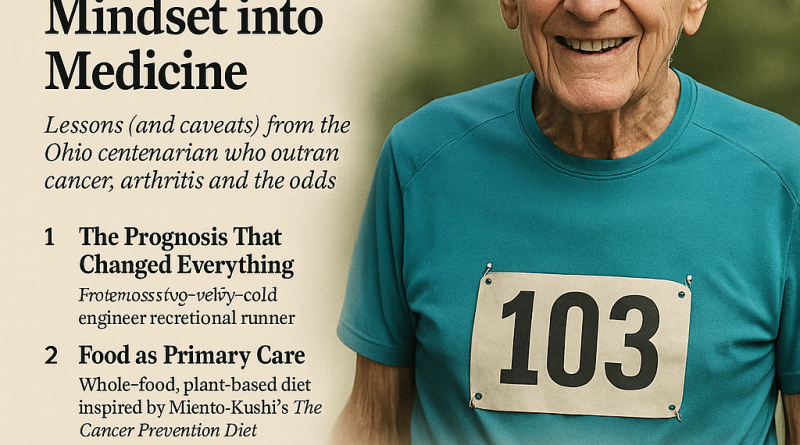From “Three Months to Live” to 103 Years of Running—How Mike Fremont Turned Food, Movement and Mindset into Medicine
Lessons (and caveats) from the Ohio centenarian who outran cancer, arthritis and the odds
1. The Prognosis That Changed Everything
In 1991, 69‑year‑old engineer and recreational runner Mike Fremont was told he had metastatic colorectal cancer and, without immediate surgery, only three months to live. He postponed the operation, chose to overhaul his lifestyle instead, and kept running. Two years later surgeons removed the primary tumour—no spread was found. More than three decades on, Fremont is 103, still paddles canoes competitively and recently became the oldest entrant in Cincinnati’s Flying Pig one‑mile event.
2. Food as Primary Care
Fremont credits a strict whole‑food, plant‑based macrobiotic diet—inspired by Michio Kushi’s The Cancer Prevention Diet—for both his cancer remission and the disappearance of crippling arthritis. His daily fare is spartan but consistent:
| Core foods | How he prepares them | Rationale he gives |
|---|---|---|
| Brown rice & other whole grains | Boiled/steamed | Complex carbs, minerals |
| Half a can of beans every day | Unseasoned | Fibre, plant protein, phytochemicals |
| Leafy & root veg (kale, cabbage, carrot) | Steamed | Low‑calorie micronutrients |
| Seaweed | Raw or rehydrated | Iodine, trace minerals |
He excludes meat, dairy, added oils, refined sugar and ultra‑processed foods.
What the evidence says
- Large cohort reviews by the World Cancer Research Fund (WCRF) link high‑fibre diets rich in legumes and wholegrains to a lower risk of bowel cancer.
- A macrobiotic regimen, however, remains unproven and potentially deficient if not carefully planned; major cancer bodies do not endorse it as a treatment.
3. Moving Like Life Depends on It
Until age 98 Fremont ran 10 miles three times a week; today he still does pull‑ups and climbs stairs “48 times a day.” He holds single‑age world records for the marathon at 80 and 90 and for the half‑marathon at 90 and 91.
For perspective, the U.S. Centers for Disease Control and Prevention recommend adults 65+ accumulate at least 150 minutes of moderate aerobic activity plus two days of strength work weekly—targets only one in seven American seniors currently meet. Fremont exceeds them several‑fold, illustrating how capacity can be retained when training is gradual, enjoyable and lifelong.
4. The Overlooked Pillars: Sleep & Stress
Fremont treats sleep as “non‑negotiable,” averaging 8–9 hours nightly, with no screens or alarms. High‑quality sleep is repeatedly linked to lower systemic inflammation and slower cognitive decline in ageing populations.
He also:
- spends time outdoors daily,
- grows part of his own food,
- avoids synthetic household chemicals, and
- keeps social commitments light to minimise chronic stress.
Green‑space exposure and low perceived stress correlate with healthier cortisol rhythms and improved immune function—mechanisms plausibly supportive of his longevity.
5. Take‑Home Lessons (Grounded in Science)
| Evidence‑backed habit | How Mike applies it | How you can adapt it |
|---|---|---|
| High‑fibre, plant‑forward diet | Beans + veg at every meal | Fill half your plate with vegetables and swap refined grains for intact wholegrains |
| Consistent physical activity | Daily stair climbing, running, canoeing | Accumulate ≥150 min/week of moderate movement you enjoy (walking counts) |
| Muscle maintenance | Pull‑ups, paddling | Twice‑weekly resistance exercises—bands, body‑weight, or weights |
| Adequate sleep | 8–9 h, dark quiet room | Set a fixed bedtime, keep bedroom cool, limit evening screen light |
| Nature & community | Gardening, local races | Schedule outdoor time; join a walking or hobby group |
6. What His Story Doesn’t Prove
- Single‑case remission ≠ universal cure. Fremont’s outcome can’t be separated from individual tumour biology, genetics or surgical care he ultimately received.
- Macrobiotic diets can risk nutrient gaps (B12, calcium, omega‑3, total energy); professional guidance is critical before copying them.
- Survivorship bias. We hear far less about people who adopted similar regimens yet did not achieve remission.
For anyone living with cancer, oncologists urge evidence‑based treatment first, with diet and exercise as complementary strategies. Always consult medical and registered dietetic professionals before making radical changes.
7. The Bigger Message
At 103, Mike Fremont isn’t marketing a supplement or program. His life underscores a simpler paradigm: nourish with whole foods, move every day, rest deeply, stay curious, and live lightly on the planet. While the specifics of his menu or mileage may not suit everyone, the underlying principles align with decades of public‑health research on cancer prevention and healthy ageing.
“It’s not a miracle,” Fremont says. “It’s showing up for yourself—every single day.”
![]()



